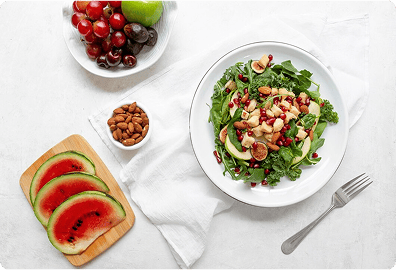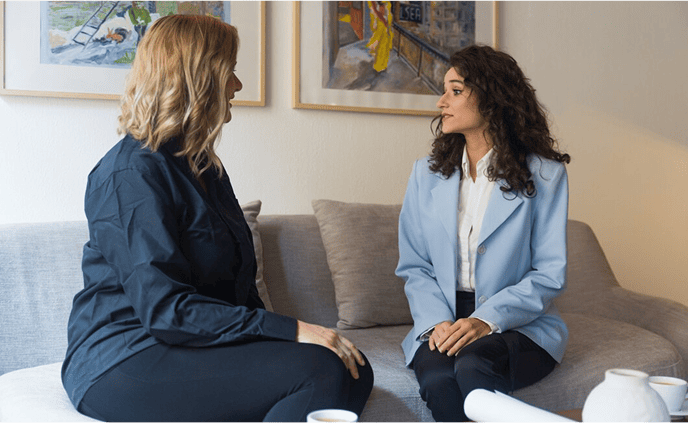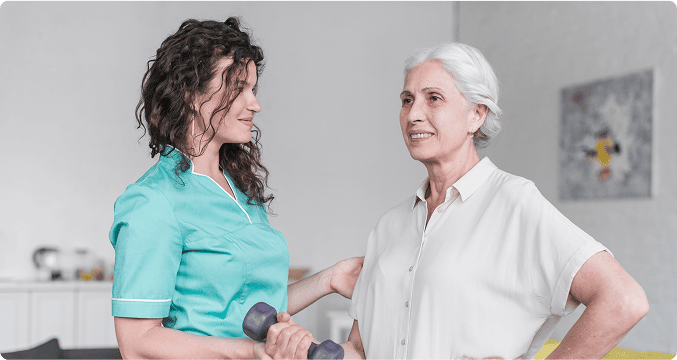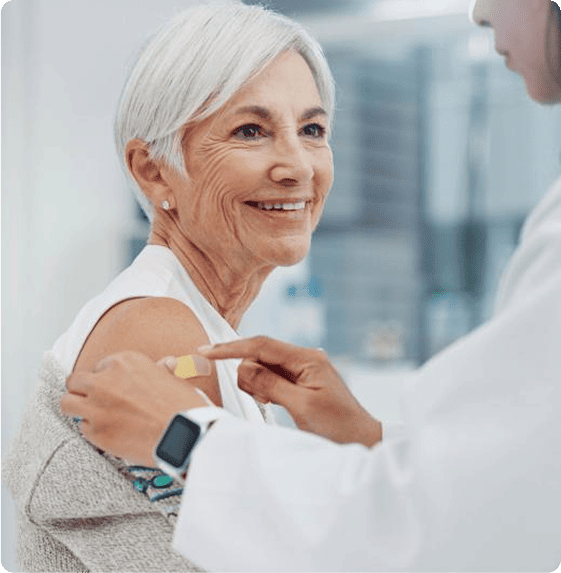Cancer Rehabilitation & Support
– Enhancing Recovery & Long-
Term Resilience
Cancer treatment affects multiple physiological systems, often resulting in muscle loss, metabolic dysfunction, immune suppression, and emotional distress. Addressing these post-treatment effects through targeted cancer rehabilitation can significantly enhance recovery outcomes and long-term quality of life.
Cancer is a battle that doesn’t end with the last treatment session. Survivors commonly experience persistent physical, metabolic, and psychological challenges—such as fatigue, muscle weakness, lowered immunity, and mental health struggles—that make recovery a complex and ongoing process.
At Good Fight, we provide a structured cancer rehabilitation program tailored to the unique needs of survivors. Our integrative approach combines physical therapy, personalised nutritional plans, gut health restoration, emotional support, and comprehensive long-term health monitoring. This holistic model helps individuals rebuild strength, regain balance, and reclaim a higher quality of life.

The Challenges of Cancer Recovery
Up to 70% of cancer survivors experience long-term side effects following treatment, with the most common challenges including muscle atrophy, metabolic imbalances, digestive issues, and psychological distress (Macmillan Cancer Support, 2021). Chemotherapy and extended periods of inactivity often result in sarcopenia—a loss of muscle mass and strength, which can reduce mobility and endurance. Metabolic dysfunction is also common, as cancer treatments can disrupt insulin sensitivity, hormone regulation, and lipid metabolism.
Additionally, survivors frequently struggle with digestive concerns due to gut microbiome disruption, leading to poor nutrient absorption, inflammation, and nutritional deficiencies. On an emotional level, many face lingering psychological effects such as anxiety, depression, PTSD, and a persistent fear of recurrence, all of which can significantly impact quality of life.
Cancer rehabilitation is about more than just surviving—it’s about thriving. Our structured approach helps individuals rebuild their strength, optimise health, and regain confidence in life after cancer.
Muscle Loss & Physical Weakness
Prolonged inactivity and treatment side effects lead to reduced muscle mass, fatigue, and decreased mobility, affecting independence and daily life.
Metabolic Imbalances & Weight Changes
Cancer treatments can cause fluctuations in body weight, insulin resistance, and hormonal shifts, impacting long-term metabolic health.
Digestive Issues & Nutrient Deficiencies
Many individuals struggle with poor digestion, loss of appetite, and gut health imbalances, making it difficult to absorb essential nutrients.
Emotional Distress & Psychological Impact
Anxiety, depression, and trauma are common after cancer treatment. Many survivors experience fear of recurrence, stress, and post-treatment adjustment challenges.
How Our Cancer Rehabilitation Program Supports Recovery
Our structured, evidence-based rehabilitation program integrates key pillars of recovery. We implement a strength training strategy using progressive resistance training to reverse sarcopenia and improve mobility. There’s a dedicated focus on metabolic health, combining nutrition and physical activity to restore insulin sensitivity and energy metabolism. We place strong emphasis on creating targeted nutritional plans to strengthen the immune system and promote cellular healing.
Our program also supports cognitive and brain health through mindfulness practices, Cognitive Behavioral Therapy (CBT), and emotional resilience training. A science-driven approach to gut and microbiome health includes probiotic and prebiotic therapy, along with anti-inflammatory nutrition to enhance nutrient absorption and immune function. Additionally, our long-term monitoring and preventative care model features continuous biomarker tracking and recurrence risk assessments to guide ongoing recovery.
At Good Fight, we offer a multidisciplinary rehabilitation program designed to support cancer survivors at every stage of their recovery. Our approach focuses on:
Restoring physical strength and endurance through tailored exercise programs.
Optimising nutrition to boost immune function and reduce inflammation.
Addressing emotional and psychological well-being through trauma-informed therapy.
Improving digestive health to enhance nutrient absorption and restore gut balance.
Providing long-term monitoring to reduce the risk of cancer recurrence.
Our personalised rehabilitation plans help individuals regain control of their health and feel empowered in their recovery journey.

Our Cancer Rehabilitation Services

Post-Treatment Recovery Programs
Physical activity plays a crucial role in post-cancer recovery. Our rehabilitation programs are designed to:
Rebuild Muscle Strength & Improve Mobility
Gentle resistance training and movement therapy.
Combat Fatigue & Enhance Energy Levels
Gradual, structured exercise programs to restore stamina.
Support Lymphatic Drainage & Circulation
Exercises designed to prevent lymphedema and support healing.
These programs are tailored to each individual’s medical history, treatment effects, and personal fitness level.
Targeted Nutrition Plans for Immune Support
Proper nutrition is essential for healing, immune function, and long-term wellness. Our targeted dietary interventions focus on:
Strengthening the Immune System
Nutrient-rich diets to support white blood cell production.
Reducing Inflammation & Supporting Recovery
Anti-inflammatory foods to minimise post-treatment discomfort.
Preventing Malnutrition & Deficiencies
Meal plans tailored to restore essential vitamins and minerals.

Emotional & Psychological Support
Mental and emotional well-being is just as important as physical recovery. Our support services include:
Trauma-Informed Therapy
to help survivors process their experiences.
Stress Reduction & Coping Mechanisms
through mindfulness and relaxation techniques.
Personalised Counseling Sessions
to address anxiety, depression, and life after treatment.
By prioritising emotional healing, we help individuals build resilience and a positive outlook on their recovery.
Microbiome & Gut Health Optimisation
Cancer treatments often disrupt gut bacteria, leading to digestive issues and poor nutrient absorption. Our gut health strategies focus on:

Probiotic & Prebiotic Nutrition to restore microbial balance

Dietary Adjustments to support digestion and improve nutrient absorption.

Hydration & Detoxification Plans to enhance overall metabolic function.

Long-Term Monitoring & Preventative Care
Regular monitoring ensures long-term health stability and reduced recurrence risks. Our program includes:
Routine Health Assessments to track physical recovery.
Nutritional Adjustments based on ongoing metabolic and immune system needs.
Lifestyle Interventions to maintain a cancer-preventive approach.
By staying proactive, survivors can enjoy better health outcomes and peace of mind.

Why Choose Good Fight Health Clinic?
At Good Fight Clinic, we take a holistic, expert-led approach to cancer rehabilitation, ensuring that every survivor receives personalised care tailored to their unique recovery journey. Our medically guided interventions focus on long-term resilience, combining physical rehabilitation, nutritional therapy, and emotional support to promote complete healing. With a comprehensive strategy designed to restore strength, rebuild confidence, and enhance overall well-being, we empower cancer survivors to move forward with renewed vitality and a stronger, healthier future.
Ready to Take Charge of Your Health and Well-Being?
At Good Fight, we integrate medical expertise with evidence-based wellness strategies to support longevity, metabolic health, cancer recovery, and mental well-being. Our programs are designed to prevent and manage chronic conditions through advanced diagnostics, personalised interventions, and structured rehabilitation.
FAQs – Have Questions?
Yes, our program is tailored to individual needs and is suitable for survivors of all cancer types and stages.
Cancer rehabilitation can begin immediately after treatment, once your doctor clears you for physical activity and dietary adjustments.

